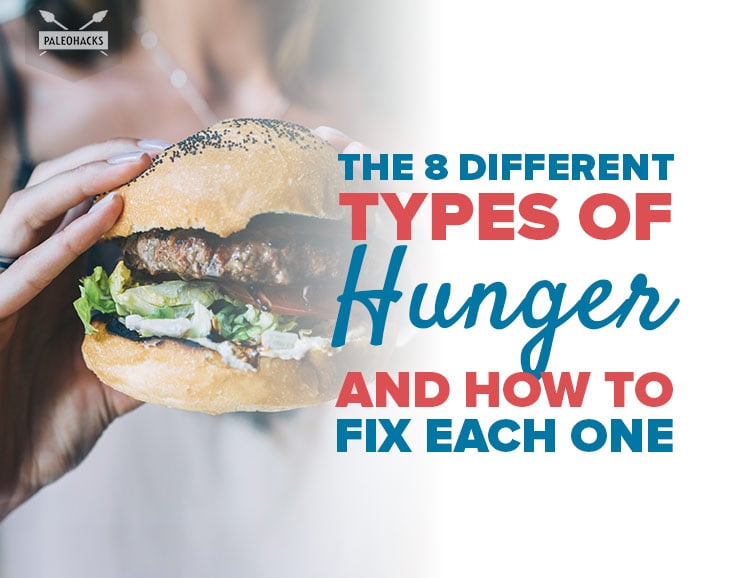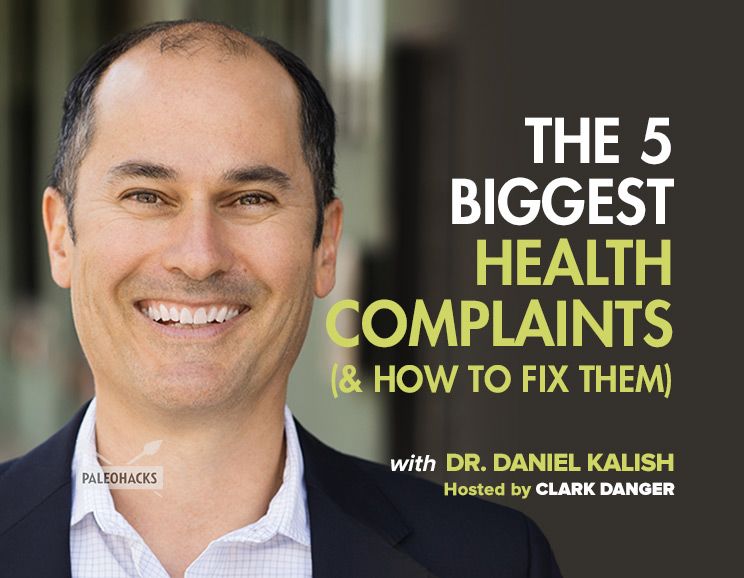We’re all familiar with the concept of feeling hungry, but sometimes we lose touch with why we are hungry. Here are the most common types of hunger — and how to combat each one.
Not all hunger pangs are the result of actually needing to eat food, and when we can understand the different causes and types of hunger, we can meet our body’s needs and achieve our health goals.
What Is Hunger?
Hunger is typically referred to as the feeling you get when you need to eat food. But sometimes we can feel hungry even when we don’t need to eat or have recently eaten. If you spend any length of time Googling the subject of hunger, you’ll find articles telling you there are seven, eight, and even ten types of hunger. Could there really be ten ways to say, “I’m hungry?”
While hunger can be an ambiguous term, it is primarily defined as “the painful sensation or state of weakness caused by the need of food.” Appetite, on the other hand, refers to the desire for food, perhaps even when a need is not there.
Want to learn more about Paleo and how it can help you?
Grab our FREE “What Is Paleo?” Guide by clicking here!
Hunger can be triggered by more than the actual reason of needing to eat. Understanding these different triggers will enable you to assess what is causing you to eat certain types of food, and how to ensure that your eating habits are healthfully aligned.
Bottom line: Hunger is a legitimate need for food, but can often be mistaken for appetite. Hunger can be caused by different reasons, and the cause may not always be obvious.
8 Types of Hunger and How to Satisfy Each One
While there’s the normal “haven’t-eaten-in-awhile” hunger, there are several other reasons why hunger sensations occur more frequently, are stronger, or come attached with strong cravings.
Here we’ll explore the different types of hunger, plus how you can naturally and healthily address each one – without eating around the clock.
1. Your Hormones Are A Mess
The hormones ghrelin and leptin fluctuate within your body to convince you to eat. When you eat, leptin is released and signals to your brain that you are full, or at least reduces your motivation to continue eating. After a few hours without food, those leptin levels drop and ghrelin is released, which brings back those feelings of hunger.
In some people, however, leptin responses can be slow, which is why some people can easily overeat – they aren’t sensitive to leptin’s cues to slow down and stop eating. At the same time that leptin sensitivity is suppressed, ghrelin can overproduce, causing perpetual stimulation and the constant desire to eat more food.
So how do you correct an imbalance in leptin and ghrelin? Leptin resistance can be induced from inflammatory causing dietary sources, as well as excess body fat. Body fat and inflammation go hand in hand, and sometimes one causes the other, or sometimes they produce a cyclical effect that seemingly never ends.
How to Fix It
You can eat your way out of leptin resistance by quitting processed food, increasing dietary fiber intake, balancing your meals with protein, and exercising to cure these types of hunger by righting off-balanced hormones. (1,2,3,4)
2. Your Blood Sugar Is Low or You’re “Hangry”
Hangry is a term that has come to mean hunger-induced irritability. For anyone who experiences blood sugar swings or hypoglycemia, this can be a frequent stop on the appetite roller coaster.
For people whose blood sugar isn’t as stable, high-carb meals or low-protein meals can cause glucose instability, resulting in quick spikes and then drops not too long after meals. Going too long between meals can lead to feelings of anger, frustration, and even moodiness, which is why feeling hangry can be a legitimate dietary problem.
How to Fix It
If you’re prone to regular hangry outbursts, the best way to address these types of hunger is to eat foods that promote blood sugar stability. This means including protein with every meal, and eliminating or reducing sugars and refined carbs that cause quick spikes in glucose. Instead, opt for low-starch vegetables and slow-digesting carbs like those high in fiber. Good carb sources for glucose balance include nuts, seeds, turnips, beets, berries, and cruciferous vegetables. You can eat starchier carbs, just be sure to pair them with plenty of protein and some healthy fat to balance the digestion and use of the glucose.
3. You’re Stressed To the Max
When you’re overwhelmed with stress, the fight or flight response caused by the nervous system, floods the body with cortisol and epinephrine, both of which can tell you to eat up for your impending battle. (5) Because so much of today’s stress is chronic, cortisol levels can often remain high for a long time, leading to a constant desire to eat. This is the main reason why stress, especially chronic stress, can lead to weight gain.
How to Fix It
In order to combat stress-induced hunger signals, you need to find a healthy mechanism for decreasing stress and also choose nourishing foods. Most stress cravings don’t come in the form of broccoli and bone broth, so while it’s important to work through stress in proactive ways (like exercise, sleep, massage, mindfulness, etc.), it’s also important to eat foods that can help to decrease stress.
Foods rich in magnesium can have a relaxing effect on the body. Dark chocolate is a good source of magnesium, and can also appease a desire to eat sweets when you’re feeling overwhelmed. Just make sure it’s true dark chocolate (isn’t filled with junky fillers like refined sugars) and eaten in moderation. Ensuring a regular intake of healthy Omega-3 fats can also keep inflammation levels low, preventing long-term and chronic damage from constant stress.
4. You’re Not Getting Enough Sleep
Sleep is vital for so many reasons, but it’s also important for appetite regulation. When we run short on sleep, hormones can struggle to maintain normal production, and that includes the hormones that tell you you’re full. If you’re chronically exhausted, the body can also send out these types of hunger signals as a way to try to find more energy to function, but in this case, no amount of food will be able to undo a lack of restful sleep. The real kicker here is that the body is picky about the kind of sleep you get, so just napping extra during the day won’t be enough to correct hunger miscues. (6)
How to Fix It
Figuring out a way to achieve a healthy nighttime sleep routine, is crucial for proper rest and appetite signaling, not to mention countless other aspects associated with health and wellness. Limiting your exposure to artificial light (like your cellphone), using black-out curtains, and creating a source of white noise, are just some of the many ways you can get better sleep and regulate your appetite.
5. You’re Addicted to Food (or Have Addictive Behaviors)
Even if you don’t have a food addiction problem, pathways in the brain associated with addiction can include food and eating by association. Whether it’s gambling, alcohol, or something else, if you have existing addictive patterns, food cravings can easily become part of an addictive habit or routine. This can be true even for people who aren’t obese, although obesity and food addiction can definitely go hand in hand.
How to Fix It
Not everyone will be prone to addiction, and certain genetics or experiences can lead to addictive patterns and behaviors. Alcoholics, for example, can become sober, but can easily trade an alcohol dependence for a sugar or other food dependence. (7) In cases of actual eating addiction, simply restricting food intake won’t be enough to rewire the brain’s behavioral patterns. If you suspect that you have an addiction to eating or food, the best way forward is to seek professional help. While eating addiction may seem harmless, it is the presence of addictive behaviors in life that can eventually lead to more serious consequences.
6. You’re Actually Thirsty
The hypothalamus is a region of the brain that regulates both hunger and thirst, and sometimes we can misinterpret hydration signals as hunger signals. Dehydration is more common than true hunger, so unless you’re a pro at drinking plenty of water and other hydrating beverages, like herbal tea, then your frequent hunger cues might actually be your body saying it’s thirsty. Considering that the body is an average of 60 percent water, when hydration dips a little low, the cells know and they want it remedied, fast. (8) If you’re constantly snacking but still getting those types of hunger cues, it’s probably because the actual need isn’t being met.
How to Fix It
Make it a habit to carry a reusable water bottle with you, this makes it easy for you to hydrate wherever you are. If you’re not a fan of plain water, try infusing it with some fruit to make it easier to get down. You can even set a timer on your phone to remind you to drink regularly throughout the day.
7. You Have a Super Fast Metabolism
While most might wish they had this problem, for those who were born with naturally high metabolism or who have exercised their way into them, frequent hunger signals can feel exhausting. If you’re not carrying extra weight and you don’t gain easily, your hunger cues may be legitimate needs for energy, i.e. food.
How To Fix It
You can delay hunger signals by eating a good mix of healthy fats, proteins, and high-quality carbohydrates, including healthy starches. Paleo starches like sweet potatoes, bananas, plantains, and cassava can all help to add more dietary fuel and stall off hunger pangs for highly active people.
8. You’re Bored
Some people truly become so accustomed to associating food with entertainment that they can seek food as a boredom buster during lulls in a work day, a weekend, or any other time. If your first thought when you have nothing else to do is that you should get a snack or eat something, chances are you’re simply not in tune with true hunger signals.
How to Fix It
Focusing on mindful eating as a practice, can help to retrain your brain to recognize true hunger versus a boredom appetite. In a culture that very much centers special events and fun around food, snacks, and treats, it can be easy to fall into this way of thinking as a default. Focusing on being all in the experience of eating when you’re enjoying a meal, can help to teach you to recognize true signs of hunger. Learning to associate fun and recreation with non-food activities can also help to shift the focus away from food and onto better ways to occupy your mind between meals.
(You’ll Also Love: Why Some People Get ‘Hangry’ and 3 Ways to Avoid It)






















Show Comments